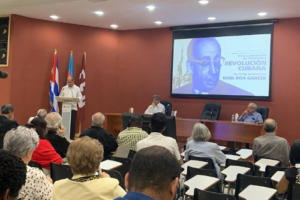 Havana, Cuba.- The 65th anniversary of the triumph of the Revolution and the 117th anniversary of the birth of politician and diplomat Raúl Roa García (1907-1982) were the theme of a conference held Monday at the Higher Institute of International Relations (ISRI) in Havana.
Havana, Cuba.- The 65th anniversary of the triumph of the Revolution and the 117th anniversary of the birth of politician and diplomat Raúl Roa García (1907-1982) were the theme of a conference held Monday at the Higher Institute of International Relations (ISRI) in Havana.
Rogelio Sierra Díaz, ISRI rector, highlighted the character of resistance and victories that have characterized the more than six decades of the Revolution in power of the Cuban people.
Sierra Diaz alluded to feats such as the elimination of racism, the promotion of education, health, culture, scientific development and the struggle for human rights, but also of confrontations against U.S. imperialism and the consequences of its devastating and unilateral policy.
He urged Cuban citizens to fulfill their assigned functions, to dethrone the growing anarchy and to be supportive and austere, always acting for the collective good and not for the individual.
He also pointed out the foreign policy as an achievement of the Revolution and the important role of Raúl Roa García, known as the Chancellor of Dignity, in that majestic feat.
Ambassador Abelardo Moreno referred to Roa García as the founder of different generations of diplomats and to the close bond he had with Commander-in-Chief Fidel Castro Ruz.
Roa Garcia’s tireless battles in the Organization of American States (OAS) and the United Nations, as well as his efforts in favor of the anti-colonial struggle of the African peoples, were the starting points for the speeches of ambassadors Eduardo Delgado and Oscar Oramas, respectively.
Carlos Fernández de Cossío, Vice Minister of Foreign Affairs; Raúl Roa Kourí, President of the “Raúl Roa García” Honorary Chair and Eumelio Caballero Rodríguez, Executive Secretary of the Chair, were present during the meeting.
Cuban revolutionary fighter, student and intellectual Raúl Roa García served as Minister of Foreign Affairs of the Republic of Cuba from July 17, 1959 to December 2, 1976.
He was called the Chancellor of Dignity when, in a meeting of the OAS held in 1960 in Costa Rica, he was convinced that Cuba’s just demands would never be met, he stood up and expressed that he was leaving with his people, and together with them the peoples of the continent.